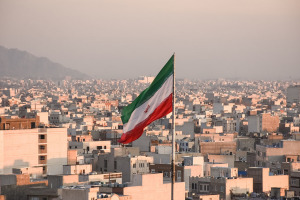Shiphrah and Puah: Protectors of Life
"Therefore God dealt well with the midwives: and the people multiplied, and waxed very mighty. And it came to pass, because the midwives feared God, that He made them houses."
Exodus 1: 20, 21
King James Version
EXPLORATION
"Shiphrah and Puah"
Protectors of Life
"There are two ways, one of life and one of death, and there is a great difference between the two ways."
Didache
What value do I place on my life and the life of all God's children?
"The earliest Christian ethic, from Jesus to Constantine, can be described as a consistent pro-life ethic; it pleaded for the poor, the weak, women, children and the unborn. This pro-life ethic discarded hate in favor of love, war in favor of peace, oppression in favor of justice, bloodshed in favor of life."
Michael Gorman
INSPIRATION
"We won't always know whose lives we touched and made better for our having cared, because actions can sometimes have unforeseen ramifications. What's important is that you do care and you act."
Charlotte Lunsford
Recently I have been reading a book of compiled essays written by a wide variety of individuals, some who are well-known and others who are totally unknown.
One of the essays was penned years ago by the famed American composer and conductor Leonard Bernstein. In his feature entitled, The Mountain Disappears he wrote these words, "One person fighting for the truth can disqualify for me the platitudes of centuries. And one human being who meets with injustice can render invalid the entire system which has dispensed it."
This is exactly what happened when two women, Shiphrah and Puah, armed with the "fear of God" in their hearts and His words of wisdom in their mouths refused to be intimidated by Pharaoh's threats – no matter how vicious.
These women chose instead to stand up for the gift of life. And as protectors of this gift, they were able with quiet confidence to undo evil in a society controlled by a ruthless Pharaoh.
As I have studied these women, I have wondered how many Hebrew mothers with male children told their little boys, "You are alive today because Shiphrah and Puah defied the demand of the King." And think of the young men who grew to admire the courage of two women who said, "Life is God's gift!"
It would have been very easy for these midwives to look at the terrible conditions facing Hebrew children growing up in Egypt. All the young male children faced was life under the whips of tyrannical taskmasters. Year after year, the harsh treatment beat down, not only the bodies but the spirits of Jacob's ancestors. Who would want their children growing up in such a horrid and torturous environment? What pain; what suffering; and what a hopeless existence. Do these words sound too familiar? Aren't they some of the same reasons given in society today, reasons that are used to devalue life as nothing but a clump of useless cells?
Not long ago, I came upon a written piece put together by an unknown author. The individual who wrote this describes four situations:
FOUR SITUATIONS
"1. There's a preacher and wife who are very, very poor. They already have 14 children. Now she finds out she's pregnant with their 15th! They're living in tremendous poverty. Considering their poverty and the excessive world population, would you recommend she should have an abortion?
2. The father is sick with sniffles, the mother has TB. They have four children. The first child is blind, the second is dead. The third child is deaf, the fourth has TB. She finds she's pregnant again. Given the extreme situation, would you consider recommending abortion?
3. A white man raped a 13-year-old-black girl and she became pregnant. If you were her parents, would you consider recommending abortion?
4. A teenage girl is pregnant. She's not married. Her fiancé is not the father of the baby, and he's very upset. Would you consider recommending abortion?"
THE RESULT
"If you would have recommended abortion in any of these situations:
then, in the first case, you recommended killing John Wesley;
In the second case, you recommended killing Ludwig Von Beethoven;
In the third case, you recommended killing the famous gospel singer Ethel Waters;
In the fourth case, you have just recommended killing Jesus Christ."
The midwives in Egypt didn't place a compromised value on the lives of the children they brought into the world, just because the world at that time was compromised. Instead, they valued the potential in each life because of the value the Creator of every child had instilled in them.
The Psalmist David so beautifully describes God's creative power which is evident in each of His children, in Psalm 139: 13-17 (N.I.V.):
"For you created my inmost being;
you knit me together in my mother's womb.
I praise you because I am fearfully and wonderfully made;
your works are wonderful,
I know that full well.
My frame was not hidden from you when I
was made in the secret place.
When I was woven together in the depths of the earth,
your eyes saw my unformed body.
All the days ordained for me
were written in your book
before one of them came to be.
How precious to me are your thoughts,
O God!
How vast is the sum of them!"
Unfortunately though, as Henri Nouwen aptly describes, we treat life with such disrespect because so much of the violence in our world is "based on the illusion that life is a property to be defended and not a gift to be shared."
While protecting life at birth was the vital role of the Hebrew midwives, I would contend that today in the 21st century protecting life from conception to death is a calling our Creator has instilled in the beating hearts of all His children. This means that if I value the "conceived" life I must also value the life of that child who may be born into the destructive and demoralizing clutches of poverty. It means that no matter what country or nationality or social status or educational level a person has, I recognize their equal value because they have the same Creator as I.
So often, those who place little value on life at conception do so because they watch those who fight for the value of life initially, walk off and leave a child to the challenges of poverty and lack, without giving a second thought.
The wonderful Christian author, Janet Morley, in a poignantly written prayer, perfectly describes what I believe was the power at work in the lives of Shiphrah and Puah.
"Vulnerable God,
you challenge the powers that rule this world
through the needy, the compassionate,
and those who are filled with longing.
Make us hunger and thirst to see right prevail,
and single-minded in seeking peace;
that we may see your face
and be satisfied in you,
through Jesus Christ."
I love the way the story of Shiphrah and Puah ends. In Exodus 1: 20, 21 we find that "God dealt well with the midwives" or as the Hebrew text states: God "bestowed favour" on the midwives. First, God blessed all of Israel, we are told, because of them. Second, the Bible says because they "respected and honored" God, He "appointed and provided them with families." I believe it isn't a stretch to take from this translation that not only were all the Israelites blessed because of these two women but their own families were blessed, too.
This is what happens when God's daughters, His life-givers, fear and honor Him and speak words of wisdom with God's courage and confidence as their weapons.
AFFIRMATION
"Giver of Life,
we wait with you to bear
your hope to earth's darkest places:
we wait at the places where darkness is
deeper than the deepest pain:
where love is denied:
let love break through.
Where justice is destroyed:
let righteousness rule.
Where hope is crucified:
let faith persist.
Where peace is no more:
let passion live on.
Where truth is denied:
let the struggle continue.
Where laughter has dried up:
let music play on.
Where fear paralyses:
let forgiveness break through."
Robin Green
Your friend,
Dorothy Valcarcel, Author
When A Woman Meets Jesus
[email protected]




























